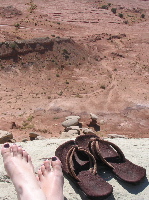The LBT on the Discovery Channel
The LBT was recently featured on the Discovery Channel's show "Really Big Things." The LBT, or Large Binocular Telescope, is a, well, really big telescope Ohio State is helping build on Mount Graham in Arizona. It's got two 8.4-m (that's 9.1 yards) diameter primary mirrors—for perspective, in the picture below, the mirrors are the two round shiny things.
But this post isn't actually about the LBT at all. It's about the Discovery Channel's depiction of science while attempting to be "funny."
What really angers me about this episode is the attitude of the show's host/interviewer "Matt," and thus the editors, etc. of the entire show. Whenever the conversation would drift towards science—you know, the reason this telescope is being built—the host would start trying to crack jokes about how confusing it is and how he doesn't understand it. Yes, the LBT is an amazing feat of engineering, and, yes, it's really big, and yes, we (as astronomers) will be able to do mind-boggling awesome things with it. But that doesn't mean that the driving science behind building it can't be explained—in fact, I think the scientists and engineers they interviewed did a fantastic job of explaining why astronomers want large mirrors and high resolution ("like an HDTV").
What gets me is how the host was obviously pretending to be stupid/ignorant and then trying to make a joke out of it. For example, at some point he asks if the telescope will be able to be used to look "back in time"—obviously he knows the answer is yes, and I highly doubt that someone would be able to even get a job hosting a show like this without having some proclitivity towards scientific thinking. The fact that looking far out in space is like looking back in time because it takes a long time for the light from far away to reach us is a standard explanation for astronomers, and I think the astronomer doing the explaining explained it well given the time constraints. And then the host was like, whoa, I'm in a time machine, that's too much for me.
Seriously? I applaud the Discovery Channel for trying to reach a different demographic (i.e., not "nerds"), but are they now implicitly supporting the idea that "science is hard" and "normal people will never be able to understand science"? Let's get this straight once and for all: science is nothing to be afraid of. Sure, there are levels of understanding which the average person won't be able to reach after a brief explanation—there are reasons why people spend so many years in school studying this stuff, after all—but that doesn't mean there isn't some level at which they should be able to understand how their computer works or why we know the universe was once a hot, dense, goupy soup of fundamental particles. This is part of what it means to be an educated individual in today's society—or at least what it should mean. I'm not saying that everyone should already have such&such knowledge and understanding, but rather, have the willingness to learn more instead of being afraid of the everso slightly mathematical unknown.
At least the Discovery Channel has the "hey, this is really cool" aspect figured out... but I am disappointed that they are also playing around in the "let's make ignorance and stupidity look funny" field.


5 comments:
Thinking too much gives you wrinkles. Now let's forget our troubles with a big bowl of strawberry ice cream! (reference, not that it should be needed)
Maybe it will help that Neil deGrasse Tyson, our conduit to the cosmos, was on with Jon Stewart (I lifted this from a Language Log entry)
"On tonight's Daily Show, Jon's guest, astrophysicist Neil deGrasse Tyson, remarked that astrophysical terminology was kept simple, because the universe is complicated enough as it is:
What is a black hole? Matter is so dense, and has such a high gravity, that light travelling even at its tremendous speeds cannot escape. So it's dark, it's a black hole, and in astrophysics, we call it like we see it. It's black, it's a hole, it's a black hole. [laughter] We are simple people in astrophysics. (Jon: You are not simple people!) We are! Our lexicon -- spots on the sun? 'Sunspots'! [laughter] No, I'm serious! The universe is complex enough! We don't want to lay down a lexicon to confuse the public, [who] try to follow what we do. The chemists do that! The medical doctors do that! Not in my field. (Jon: You are going to walk out of here tonight and get jumped by a gang of chemists.)"
(for the conduit to the cosmos quote see at about 2:13 in)
http://www.youtube.com/watch?v=ibxEE8x7J1Y
Thanks for the link, Laura. Neil Tyson is, in fact, quite awesome. You may note that telescope naming is similar, e.g., what is the Large Binocular Telescope? Well, see, it's large, and it's binocular, and it's a telescope ...
So, did anyone refer to the LBT as 2000x8400 binoculars? (I use 8x21's myself - they're 100 grams, and fit in my pocket).
I'd like to see a hot chick who really knows her stuff (or at least can pronounce the script) that talks like Sagan. Then you could have science, humor, and reach a new demographic.
But. I don't have cable, so i'll have to wait for the DVD.
Stephen, it's almost like you're trying to be funny, but it's just not working.
Either that, or you're actually an AI bot ...
Post a Comment